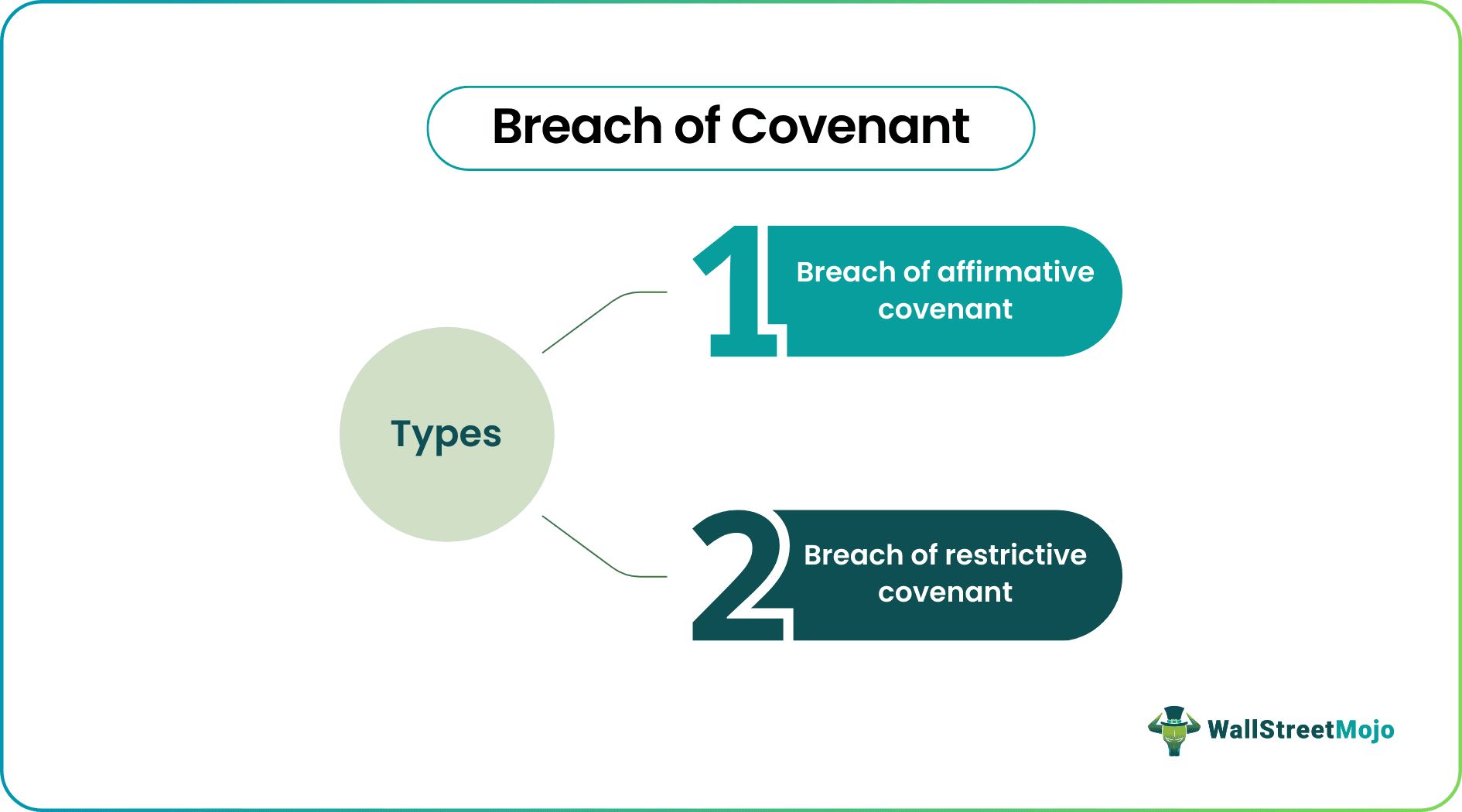Table Of Contents
What is Breach of Covenant?
Breach of Covenant happens when the parties involved in a contract fail to comply with the promises made in the agreement. The defaulting party that has breached the covenant is liable to get sued for the occurred damages.

Key Takeaways
- Breach of Covenant happens when the parties involved in a contract fail to comply with the promises made in the agreement.
- In simple words, a covenant is a written promise that cannot be violated.
- The defaulting party that has breached the covenant is liable to get sued for the occurred damages.
- A permanent injunction to prevent the breach is the main remedy for a restrictive covenant violation. However, instead of issuing an injunction, the courts can award damages.
Meaning of Covenant
In simple words, a covenant is a written promise that cannot be violated. Covenants are a part of many financial contracts. For example, banks may include a clause in a lending contract that prescribes the borrower to keep a certain ratio of debt and equity. In case of a violation, the bank will impose a penalty on the borrower.
Many traders use Saxo Bank International to research and invest in stocks across different markets. Its features like SAXO Stocks offer access to a wide range of global equities for investors.
Example of Breach of Covenant
Let us understand the concept with a simple example.
- Anderson is working in the R&D team of an FMCG company. At the time of joining, he had entered in a non-compete agreement with the company. Non-compete agreements impose certain employment restrictions on the employees.
- So, the contract stated that it would be considered a Breach of Covenant if Anderson quits this organization and joins another FMCG company within three years.
- If Anderson violates this clause, it would be treated as an offense, and he would be liable to get sued. The employer can ask the court or judiciary to impose restrictions against Anderson, which he would have to comply with at all costs.
Hence, it is important to note that this clause acts as a savior when people disobey a contract's terms. So, it is always included in an agreement to protect both the parties' rights and interests from any severe damage arising from a breach.
What are the types of Breach of Covenant?

We will now take you through these types to help you understand the concept in detail.
#1 - Breach of Affirmative Covenant
This type of breach is also called a positive covenant. Here, the agreement demands a party to do certain things to keep the deal. For example, the affirmative covenant will list certain conditions that the borrower must fulfill while extending a loan.
The lender can put together conditions like regularly showing audited reports, abiding by the rules, or timely payment of the installments. Violating any of these clauses will qualify as a breach. As a punishment, the lender may demand immediate repayment of the loan.
#2 - Breach of Restrictive Covenant
In a restrictive covenant, the contract restricts a party from performing certain acts. For example, the loan lender may prohibit the borrower from taking future loans until the existing ones have been repaid. Such a clause is also called a negative covenant. The borrower will attract a penalty for the breach of a restrictive covenant.
Consequences of Breach of Covenant
The following points will explain what a court can order in case of such a breach -
- Remedy for damages incurred by the aggrieved party: One way of settling such disputes is by ordering the defaulter to provide monetary compensation to the aggrieved party for the incurred damages.
- The Injunction to prevent a repeat of the breach: If the dispute cannot be settled by monetary compensation, the court orders for an injunction. It demands the defaulting party to end the breach and restricts it from doing it again in the future. In addition, both parties are asked to continue with the terms of the agreement.
The Route of a Waiver
If you wonder if the defaulters have any remedy for breach of covenant, then the answer to that is a waiver. When the breach and damages are non-severe, the affected parties can take a waiver route. In the case of an unconditional waiver, the defaulters aren't imposed with monetary compensation or any other provisions.
It is important to understand that unconditional waivers are very different from conditional waivers. In conditional waivers, the aggrieved party agrees to waive its right to court to fulfill certain conditions it imposes on the defaulter.
The conditions could be demanding the payment of the penalty or the compensation for the collateral part of the contract.
Importance
- Protecting the secrecy of the aggrieved party's confidential information. In addition, it also ensures protection against the damages caused to the aggrieved party.
- It ensures due payment of the compensation in case of damage to the aggrieved party.
- The court also enforces and ensures lawful completion of the contract agreement.
- In the case of lending, the positive and negative covenants try to ensure the borrower's financial stability and timely recovery for the creditor.
Disclosure: This article contains affiliate links. If you sign up through these links, we may earn a small commission at no extra cost to you.
Frequently Asked Questions (FAQs)
If the contract is breached by any of the involved parties, it is admissible in court and the defaulter party can be sued in the court of law, as the written contract has been breached.
If any Breach of Covenant occurs, the defaulter party is bound to fulfill the terms of the contract and agreement. Moreover, several considerations can be made, and failing to adhere to them could lead to legal actions.
The best remedy for Breach of Covenant is Permanent Injunction, wherein the defaulter party will be restrained from the beginning or continuing action, as well as legal retractions.

